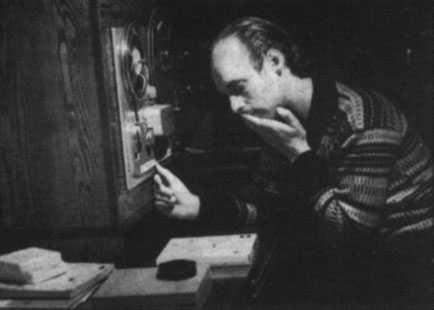Bruce Lipton and The Honeymoon Effect, Part Two – An Audio Download and Print Transcript
Listen to Bruce Lipton talk with Lisa Reagan and take Kindred readers through his foundational work presented in The Biology of Belief and Spontaneous Evolution and onward to his new book, The Honeymoon Effect” The Science of Creating Heaven on Earth in less than an hour! Please download and share:
Editor’s Note: Bruce Lipton’s Kindred teleconference transcript below is broken into three parts and titled by sections to help the reader navigate the amazing amount of information and insights Bruce shares with us:Part 1: Evolution and World Current Events: “Right on Schedule”
Part 2: Creating and Uncreating Your Life = Conscious and Unconscious Mind, BELOW
Part 3: The Honeymoon Effect: Operating from the Conscious Mind to Create Heaven on Earth
|
Part 2: Creating and Uncreating Your Life = Conscious and Unconscious Mind

Bruce: So here’s how it works. Conscious mind, it’s the latest edition of the brain. It’s a lobe of brain tissue right behind your forehead associated with what is called the frontal cortex. The rest of the brain is called the subconscious mind.
Okay, so here’s the story. Two minds. The minds collectively create life. They learn in different ways and they have different jobs, and when you understand that, you can understand why, for example, you can educate your conscious mind, but your life still stays exactly the same and it’s for this reason. Let’s go back. Function of the conscious mind, lobe of tissue, latest advance behind your forehead, pre-frontal cortex. This is the seat of your personal identity. This pre-frontal cortex is where your spirit resides, your uniqueness resides. That’s you in there.
So, imagine that little lobe of tissue having a desk and you’re sitting behind the desk looking out the eyes and you’re looking at the world that’s unfolding in front of you. You are located in there. The conscious mind has two functions that you have to understand to put the story together.
Function #1: the conscious mind is creative. That’s the great advance of having consciousness. Creative means you can use imagination. You can put things together and come up with something new. And, this is where the great human advance comes from is the creativity. So, the conscious mind is creative. If I asked you a very simple question, if I said, Lisa, tell me what you want from your life? The answer by definition, since it doesn’t exist possibly right now, by definition, this would be a creative response. This is what I want. So, I say oh…. the conscious mind has your wishes, your desires, and your aspirations for life.
I say what do you want? Heaven on earth. Okay, conscious mind. What do you want? Health. Conscious mind. I want to be in a great relationship. Conscious mind. That’s all creative. Okay? So, the conscious mind is creative. It has all your wishes, desires, your positive thinking in it and it’s specifically related to you. And the other character of the conscious mind, and this throws a monkey wrench into the system, is the conscious mind is not time bound, meaning this: if I say, what are you doing next week? It’s your conscious mind that will let go of the current moment and move visually into next week where you’ll try to visualize what are you going to do next week.
Or I say to you what did you do last week? Your conscious mind lets go of the current moment, moves backwards in time, reviews what you did historically and then helps you say, “I did this or that.” Or, if I just said something simple: in your head think about this, the moment you start thinking your conscious mind lets go of the current moment, goes up into a thinking room in your head and where you can become creative.
The Unconscious Mind: Nobody’s Home, “It’s simply a record playback device.”
 So what’s the point? The point is simply this: the conscious mind doesn’t have to stay in the present moment. In fact, it spends most of its time thinking, thinking into the future, thinking into the past, or just like daydreaming. Okay, let’s compare that with the subconscious mind. The subconscious mind most important point is simply a record playback device. It records life experiences, learns them as habits, and when you push the button it can play the life experience back without re-learning it again. So, it’s a very profoundly important mind for something simple, for example, how long did it take you to learn how to walk?
So what’s the point? The point is simply this: the conscious mind doesn’t have to stay in the present moment. In fact, it spends most of its time thinking, thinking into the future, thinking into the past, or just like daydreaming. Okay, let’s compare that with the subconscious mind. The subconscious mind most important point is simply a record playback device. It records life experiences, learns them as habits, and when you push the button it can play the life experience back without re-learning it again. So, it’s a very profoundly important mind for something simple, for example, how long did it take you to learn how to walk?
When you had to consciously as an infant try to stay in balance and try to stand upright and do all that. You were learning how to walk. Once you learned how to walk, you never have to think about it again for the rest of your life – fortunately – because if we had to re-learn it every day we’d never get out of the room. You spend all day trying to stand up and then you get so tired at night, you go to sleep and wake up the next day and then how do we stand up? Start all over again. So, guess what, we don’t have to do that.
When we learn something, it becomes a habit. It’s like a jukebox with music in it. You push the button and pull up the record or the program. So a very important part of the subconscious mind is: there’s nobody in there. And this is very frustrating, especially when you keep trying to talk to your subconscious mind to change some behavior and there’s no response. The reason why: who are you talking to? The significance is nobody in subconscious mind. You might as well go up and talk to like an old-fashioned tape player that’s playing a tape, and the programs playing, and you say, “I don’t like the program”, and I say, “Go up and talk to the tape player for a while”, and you go, “Tape player, please change the program, please!” And you talk to him until you’re blue in the face. Program continues playing. Why? There’s nobody in there; it just plays program.
And, then the other thing that’s very critical is unlike the conscious mind, which is not time bound, the subconscious mind is always in the present moment. If you ask your subconscious mind, “When did I learn how to walk?”, it would probably hesitate for a second and say today because it doesn’t see past and future. It only sees current time. So whatever you learned in the past, in your subconscious mind, it just happened. And, so there’s nobody in there. It’s a record playback device that plays habit and it’s always in the present moment.
Now here comes the issue. In order to be conscious, you have to have data. In other words, imagine if a child was just being born, head coming out of the birth canal, and it could speak. Just imagine, child’s coming out, it’s coming into the world; you see the head crown, and then the baby’s heads out and you look at him and the baby’s looking around and then you say to the baby, “Tell me something.” And, the baby would look up at you and go, “I don’t know anything, I just got here.” And this becomes very critical.
I’ll give you one more example. Let’s say we buy a brand new iPod, a music player, and the play button is like the conscious mind because you can create any playlist you want, you can select anything. So I say, you get a brand new iPod, take it out of the box, and I say, “Push play”. Nothing happens. And, you say, “Why not?” And, the answer is: well there are no programs to select from. So, you have to download programs into the memory and then the play button can be used to create a playlist.
Okay, going back to the conscious mind. The conscious mind is like the playlist, if there’s no data you can’t be conscious. There’s nothing to think about. So here is the most amazing, and if you understand it, the most powerful piece of information about your life, and it goes like this: in order to be conscious, you have to put data in.
So the brain of a child is essentially in a state of hypnosis for the first seven years of its life, meaning it downloads data without being taught. It’s like a child doesn’t have to go to class to learn things. How many details does it take to be a member of society? Thousands. I say, well who’s going to sit down and teach an infant? Okay, sit in this desk and let’s start teaching you all the rules of being a member of a family and a society. The answer is, you can’t do that, you don’t have to. Nature created the first seven years of a child in hypnosis which means this: a child observes the parents, the family, the community for seven years and it observes and records whatever it sees, so the fundamental behaviors of how to respond to life come from observing first your parents.
Nature created the first seven years of a child in hypnosis which means this: a child observes the parents, the family, the community for seven years and it observes and records whatever it sees, so the fundamental behaviors of how to respond to life come from observing first your parents. |
Boys particularly focus on their father’s behavior; girls particularly focus on their mother’s behavior. Relevance about this, it’s not like school where the child is studying saying, “Let me see how my dad does this.” It’s just a complete hypnosis: the child observes and records everything.
Point, and this is the most critical point: then the fundamental behaviors in your subconscious mind do not necessarily represent your wishes, desires, and aspirations. That’s your conscious mind. Your subconscious mind just has programs in it. But, the fundamental programs are not even yours. They came from other people. So, when you were engaged in a subconscious program, you’ll especially play the fundamental programs, and the fundamental programs by definition represent other people’s behavior and this is where problems come into our lives: because we have wishes and desires in our conscious mind but our subconscious is playing other people’s behaviors.
Who Am I? “In the first seven years people tell you who you are and you record in a state of hypnosis.”
 So, now let’s put it all together. I want to be conscious. I have to have data. Where do I get the data from? The first seven years of observing the world. Please folks, listen to this. Who are we as individuals? Think about this question. Who am I? I don’t know who I am. How do I know who I am? In the first seven years, people tell you who you are and you record it in a state of hypnosis. Think about what parents say to kids. In the most extreme and unusual situation, a parent might say, “You’re the most wonderful, beautiful, loving child that ever came to this planet and you can do anything. There’s nothing you can’t do!” And just go on and on.
So, now let’s put it all together. I want to be conscious. I have to have data. Where do I get the data from? The first seven years of observing the world. Please folks, listen to this. Who are we as individuals? Think about this question. Who am I? I don’t know who I am. How do I know who I am? In the first seven years, people tell you who you are and you record it in a state of hypnosis. Think about what parents say to kids. In the most extreme and unusual situation, a parent might say, “You’re the most wonderful, beautiful, loving child that ever came to this planet and you can do anything. There’s nothing you can’t do!” And just go on and on.
And, I say that’s a very unusual response as a parent because parents act like coaches. What I mean by that is when you’re coaching a team and one of the performers isn’t doing well, you criticize that player saying, “Come on you can do better than that. You don’t deserve being on this team. You’re not good enough.” The athlete, whatever, the kid, understands what the coach is trying to say because they’re conscious and they’re saying, “Oh yeah, the coach wants me to work harder so I’ll be a better player or performer.”
And then I go, “Well that’s really cool if you’re conscious, but what if you’re not conscious, what do you hear?” Whatever you hear is directly recorded. And, I say, “Well what do parents generally say as coaches?” Well, trying to get the child to perform better, they generally say things like, “You can do better than that. Who do you think you are? You’re not lovable. You don’t deserve things.” They’re saying that not to put the child down as much as, “Come on, if I put that little pin in you, it’ll push you to do better.” And, I go, “That’s really cool, but the child has to be conscious to understand what you’re trying to do.”
Therefore, if you say anything of these critical things to a child before seven, the child is not conscious, and – what is it doing? Recording the exact words. “I do not deserve. I am not loveable. I am not smart enough.” All these kinds of issues and that’s because now, what is it? It’s a habit. I download a habit: “I’m not good enough. I’m not deserving.”
And, I go, “Why is this important?” I’ll give you just a summary very quickly. In workshops where we do muscle testing and try to identify subconscious beliefs, over 80% of the attendees in every workshop will not test positive for the belief “I love myself.” And, the reason why is with all the critical assessment the subconscious mind doesn’t hold a picture of being a loveable, wonderful, capable child. It has all of the critical reviews. And if you can’t love yourself, and 80% of us won’t test for that, then think about the impact of trying to find love in your life. If you can’t love yourself, then truthfully how can anybody else love you? Because if they say they love you, and you don’t find yourself loveable, then you look at them and go, “Well, you don’t really have any quality control if you love me.” And, so basically we deny love and then we spend our whole lives looking for love without recognizing the subconscious program is undermining the conscious desires.
And if you can’t love yourself, and 80% of us won’t test for that, then think about the impact of trying to find love in your life. If you can’t love yourself, then truthfully how can anybody else love you? Because if they say they love you, and you don’t find yourself loveable, then you look at them and go, “Well, you don’t really have any quality control if you love me.” And, so basically we deny love and then we spend our whole lives looking for love without recognizing the subconscious program is undermining the conscious desires. |
So, now all of the data I just talked about comes to this understanding: The conscious mind has our wishes and desires and what we want out of life. The subconscious mind has programs and fundamentally programs are derived from other people.
Now the big monkey wrench in the machine of life, the conscious mind remember is a thinking mind and when it’s thinking it leaves the present moment whether it’s looking into the future or looking into the past or just thinking of something. And, when the conscious mind is not paying attention, the default is the subconscious programming. And, the problem is if you’re playing a subconscious programming, and your conscious mind is thinking, then by definition, you do not see the behavior that is coming forth from your subconscious mind.
So, I give this in my lectures and people laugh because they’re familiar with it. It goes like this. You have a friend, you know your friend’s behavior very, very well and you happen to know your friend’s parents. And at some time you see that your friend has some of the same behavior as their parent, so you casually volunteer a simple little thing like, “Hey, you know, Bill, you’re just like your Dad.” And, you back away from Bill because Bill goes ballistic by first saying, “How can you compare me to my Dad?”
Most people laugh because they’re very familiar with this and I go, this is the most profound story I can tell you right now for a very simple reason: everybody else can see that Bill behaves like his dad. The only one who doesn’t see it is Bill. I say, why doesn’t Bill see it? The answer is simple because, a) he got the behavior from observing his dad in his subconscious and he plays the behavior when his conscious mind’s not paying attention and because his conscious mind’s not paying attention, he does not observe his own behavior which isn’t his actually, it’s his father’s, and it could be self-sabotaging.
Generally, psychologists tell us this, about 70% of the programs that we got downloaded in our subconscious mind are disempowering, limiting, and self-sabotaging. What does that mean? It means when your conscious mind is not paying attention, we’re invisibly sabotaging ourselves by playing behaviors that do not support who we are.
Now comes the big number that neuroscience came out with. How much of our life is coming from the conscious creative wishes and desires mind and how much of our life is coming from the habit-playing subconscious mind? And, here’s the number: 5% of our life comes from our creative wishes, desires, and aspirations. 95% comes from the programs in the subconscious. And, then you recognize, “Oh my god! 95% of your life is playing programs and you don’t even see it and most of these programs are negative and self-sabotaging.” So, like Bill, you’re engaged in a behavior and you don’t see it.
And I go, oh wow, this has been the problem of our lifetime because we are all Bill! We all play these programs coming from other people and when we do, almost inevitably we fail to see it. And sometimes when we do see it, when we see ourselves playing like your mother or your father’s behavior or something that was silly, it’s almost personally embarrassing. It’s like, “Oh my god, I was just behaving in this way!” But that’s a rare event. Most of the time we never see it.
READ Part 1: Evolution and World Current Events: “Right on Schedule”
- Crisis Precipitates Evolution: “It is necessary that the world fall apart.”
- Humanity: The Emerging Superorganism
- The Honeymoon Effect: When Did You Last Feel It?
READ Part 3: The Honeymoon Effect: Operating from the Conscious Mind to Create Heaven on Earth
- The Move The Matrix: “It’s actually a documentary.”
- You Don’t Know If You Don’t Know: “If I don’t know how something works, how can I be guilty?”
- Women and Men: Cultural Programming Differences
- Reprogramming: “Reading self-help books doesn’t work.”
- Conscious Parenting: “The rule of the day to help us evolve from the mess we’re in.”


